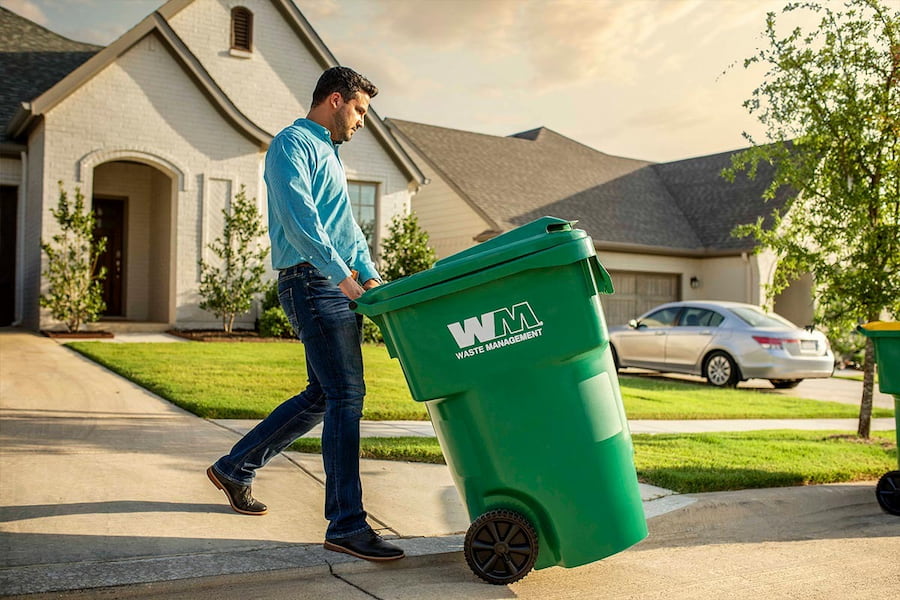Composting is a good and green way to dispose of your yard & garden leftovers while giving you free fertilizer. Composting is, in fact, controlled decomposition. These organic materials gradually decompose with mini skip hire wigan, and microorganisms like bacteriaand fungi feed upon them. After a while this breakdown turns the waste into compost in its black, crumbly form.
Compost is an excellent soil improver. It helps improve the structure of soils, provides plants with key nutrients they need to stay healthy and productive, retains moisture in a well-drained way while releasing water into it at appropriate times (in other words providing stable humidity), and encourages all sorts of helpful microorganisms–including beneficial bacteria–to live there.
When your compost is ready, you can introduce it into the garden soil. This nutritious soil enhancer is added to the dirt, providing plants with better growth and making chemical fertilizer use unnecessary. It also aids your garden soil retaining moisture, which is especially beneficial during dry spells.
Utilizing Municipal Collection Services
Many local governments offer curbside pickup services for yard waste, making it a convenient option for disposal.
Municipal Collection Services: Local municipalities often have scheduled pickup services for yard and garden waste. You can inquire with your local government or check their website to find information about pickup schedules and guidelines.
Bringing Waste to Designated Facilities
Drop-off centers and recycling facilities provide another option for disposing of yard and garden waste. Here’s how this method works in more detail:
Finding Nearby Facilities: Research and locate nearby waste drop-off centers or recycling facilities that accept yard and garden waste. These centers are equipped to handle various types of green waste.
Convenient Disposal: These facilities often provide separate areas or designated containers for green waste disposal. This makes it convenient to unload and properly dispose of materials like branches, leaves, and grass clippings.
Responsible Recycling: Many drop-off centers focus on responsible recycling practices. Yard waste collected at these facilities is often processed into valuable resources, such as mulch or compost, which can be used in landscaping and agriculture, further promoting sustainability.
Drop-Off Centers: Bringing Waste to Designated Facilities
When it comes to disposing of yard and garden waste, drop-off centers and recycling facilities are valuable options. Here’s a closer look at this approach:
Finding Nearby Facilities: Begin by identifying waste drop-off centers or recycling facilities in your local area. Many communities have these centers, and they can typically be found through a quick online search or by contacting your local waste management authority.
Dedicated Green Waste Areas: These facilities often have designated areas or containers specifically for green waste disposal. This means that you can conveniently drop off materials like branches, leaves, grass clippings, and other garden-related waste.
Responsible Recycling: Responsible recycling is the focus of many drop-off centers. The waste that ends up in these facilities often becomes the fertile mulch or compost used to promote landscape and agricultural sustainability.
Drop-Off Centers: Bringing Waste to Designated Facilities
For yard and garden waste, drop-off centers or recycling facilities are good options. Here’s a closer look at this approach:
Finding Nearby Facilities: First, find out where the local waste drop-off centers or recycling facilities are. These centers exist in almost all communities, and it is quite easy to find one if you do a quick search on the Internet or call your local refuse disposal authority.
Dedicated Green Waste Areas: Many such facilities have special areas or containers specifically for green waste. Therefore, you can easily throw away materials such as branches, leaves and grass cuttings and other garden refuse.
Responsible Recycling: When relying on drop-off centers, they tend to emphasize environmentally responsible recycling practices. Waste collected at these facilities is often turned into valuable products such as mulch or compost. This recycling process not only reduces landfill waste, but also provides environmentally friendly building materials.

Mulching: Returning Nutrients to Your Landscape
The eco-friendly way To recycle and reuse yard waste, while at the same time improving your garden. Here’s how it works in more detail:
Using a Mulching Mower: You’ll need a mulching mower, which is type of lawnmowers equipped with specially designed cutting deck that lobby fine-cut grass clippings and leaves into the ground (hence ‘mulch’). These materials are sliced into tiny pieces when you cut your lawn with a mulching mower.
Spreading Over Garden Beds: Instead of bagging and disposing of grass clippings and leaves, you can evenly spread these mulch-sized pieces over your garden beds and around trees and shrubs. Mulch serves multiple purposes:
Recycling Yard Waste: By using mulch, you’re recycling yard waste right on your property, reducing the need for disposal.
Enriching Soil: As mulch breaks down, it releases nutrients back into the soil, providing nourishment to your plants.
Moisture Retention: Mulch acts as a natural insulator, helping the soil retain moisture and reducing the need for frequent watering. Mulching not only conserves resources but also enhances the appearance of your garden beds and promotes healthy plant growth.
DIY Projects: Upcycling Yard Waste
Getting creative with yard waste is not only environmentally friendly but also adds a personal touch to your outdoor space. Here are some ideas for upcycling yard waste:
Garden Borders: Use fallen branches or twigs to create rustic garden borders or decorative fencing. These natural elements add character to your landscape. Repurpose leftover wood or pallets to build your own compost bin. This DIY project not only recycles yard waste but also produces nutrient-rich compost for your garden.
Craft garden decorations from twigs, pinecones, and other yard materials. These natural ornaments can add charm to your outdoor space while reducing waste. By practicing these methods, you can minimize the environmental impact of yard waste disposal, enrich your garden, and add a creative touch to your outdoor surroundings.
Also, read this: What are The Benefits of Adopting Zero-Waste Practices?







